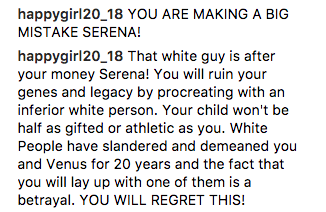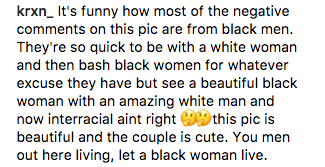These Racist Comments on Serena Williams' Photo Highlights How People Still Don't Accept Interracial Relationships

By:
Serena Williams graces the cover of next month's Vanity Fair in all her pregnant glory, but there's another photo from the magazine shoot that is garnering attention—and not for the best reasons.
The tennis champion is engaged to Reddit co-founder and executive chairman Alexis Ohanian. Upon the announcement of their engagement, some had harsh words for Williams.
Others were baffled that anyone would have that attitude:
Unfortunately, a recent photo of the couple has sparked racist comments, highlighting how even in 2017, interracial relationships aren't always accepted.
The comments ranged from short slurs to lengthy rants and everything in between.
![]() Serena Williams/Instagram - instagram.com
Serena Williams/Instagram - instagram.com
![]() Serena Williams/Instagram - instagram.com
Serena Williams/Instagram - instagram.com
 Serena Williams/Instagram - instagram.com
Serena Williams/Instagram - instagram.com
With one person making a social observation:
 Serena Williams/Instagram - instagram.com
Serena Williams/Instagram - instagram.com
There were many kind comments as well, but it's important to note the negative ones because, unfortunately, racism is still alive. To deny it is to willfully ignore what is still a prevalent issue.
Yet interracial relationships are more common than ever before.
As Willie Burnley Jr. wrote for ATTN: on Wednesday, "Even with the virtual ubiquity of bigotry, the slowly rising trend of people coming together across the color line is undeniable. In 2015, one in six newlyweds were in interracial marriages—five times as many as there were five decades ago."
Though the statistics show a rise, it doesn't mean everyone is accepting of interracial marriage.
Phys.org reported on a study by University of Washington published in July 2016 that revealed implicit biases against interracial couples.
The experiment, conducted among 152 college students, was made up of three parts, and designed to tap into a less overt form of racism.
The students were first asked "a series of questions about relationships, including how disgusted they felt about various configurations of interracial relationships and about their own willingness to have an interracial romance." Most of them scored positively in that they had "high levels of acceptance" of interracial relationships and "low levels of disgust."
Then, students were shown hundreds of engagement and wedding photos of interracial and same-race couples. "The researchers asked the students to quickly indicate whether each couple should be included in a future study on relationships, a task that was intended to ensure participants were socially evaluating the couples while their neural activity was recorded."
The couples more quickly chosen by the students to be in future studies? The same-race ones.
Lead author Allison Skinner noted in the study, "that indicates that viewing images of interracial couples evokes disgust at a neural level."
But there was one experiment left, an "implicit association test" in which two groups were shown two different sets of images and asked to associate them with either same-race or interracial couples:
"One group was first shown a series of disgusting images (a dirty toilet, a person vomiting), while the other was shown pleasant images of cityscapes and nature.
During the implicit association test, the two groups were tasked with categorizing photographs of same-race and interracial couples and silhouettes of humans and animals. They were first instructed to press one computer key if the image showed an animal silhouette or a mixed-race couple, and another key if it was a human silhouette or a same-race couple. Then the combinations were switched—participants were told to hit one key if the image was an animal silhouette or a same-race couple, and the other key if it was a human silhouette or mixed-race couple.
Participants were quicker to associate interracial couples with non-human animals and same-race couples with humans."
Skinner's conclusion? "Some people are still not comfortable with interracial relationships, or at least they're a lot less comfortable than they would appear to be. Acknowledging these biases is the first step to figuring out why people feel that way and determining what can be done so they won't."
Unfortunately, as negative Instagram comments reveal, most don't need a study to realize people are racist.
